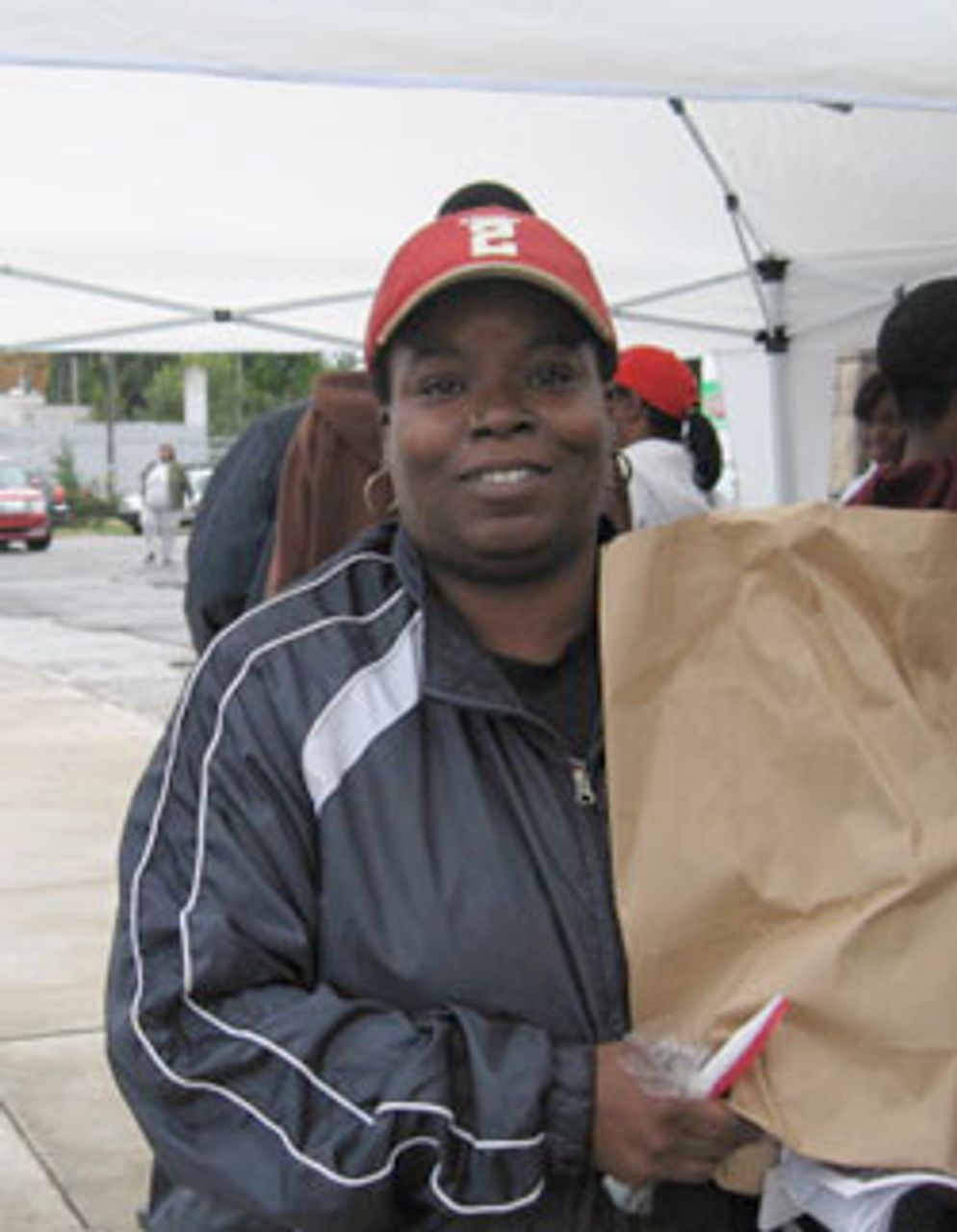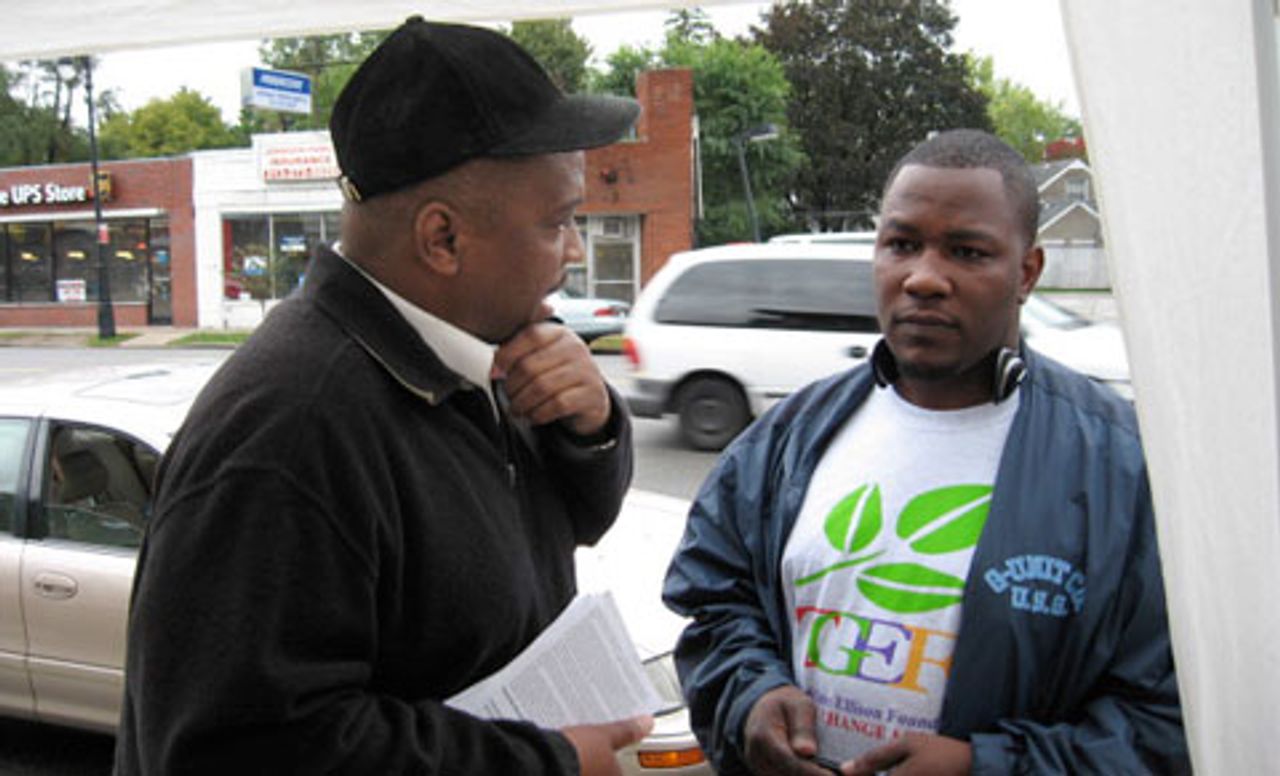On Saturday, October 2, D’Artagnan Collier, the Socialist Equality Party candidate for the 9th District in Michigan, campaigned among workers and students at a food give-away on Grand River Avenue and at a local community college where attendance has reached record levels because so many young workers are unemployed.
 D’Artagnan Collier, Syreeta Fielder and Myshiara Sparks, students at Wayne County Community College
D’Artagnan Collier, Syreeta Fielder and Myshiara Sparks, students at Wayne County Community CollegeCollege students Syreeta Fielder and Myshiara Sparks spoke at length with Collier. Syreeta is a full-time student and mother of 3 children, and Myshiara has a son. Both attend the Wayne County Community College campus in northwest Detroit.
Syreeta has been laid off for over a year after working at a Detroit casino for more than 10 years. “I was fired,” stated Syreeta, explaining that the company wanted her out to bring in younger and cheaper workers.
“This is how they treat working people these days,” stated Syreeta. “I have been on unemployment for the last year. The bills just keep coming in and they didn’t want to even pass the unemployment extension.”
“Why shouldn’t we get it?,” asked the young mother. “We paid for it all the years we were working. They didn’t want to pass the extension and yet they passed the bailout for the banks, which I thought was ridiculous.”
While discussing the utility crisis in Detroit, where over 237,000 households in southeast Michigan, including Detroit, had their utilities shut off last year, Syreeta compared the difference between her treatment by DTE Energy in Detroit with how she was treated when she lived in a suburban district before being laid off.
“I stayed in Farmington Hills and was serviced by Consumers Energy,” stated Syreeta. “My bills were never as high as they are in Detroit. I was amazed when I moved back here. Almost every month I get a notice threatening to shut my utilities off.”
While Consumers Energy also carries out massive utility shutoffs—they shut off over 31,000 households in the first five months of this year—DTE Energy was allowed by the Michigan Public Services Commission (MPSC), the state regulatory agency, to raise their rates in Detroit by 20 percent in 2009.
“I don’t believe anyone should be living without utilities,” continued Syreeta. “What is a family with children supposed to do? I agree with what you are saying. Utilities should be a right. I just don’t think it is right to shut people off.”
Myshiara was upset with the overcrowded conditions in the Detroit public schools, especially for young children.
“I personally think it is sad that so many schools are closing,” said Myshiara. “I took my son to school for kindergarten and they had 50 kids in the class. Can you imagine 50 five-years-olds in a class? They are only supposed to have 15 to 20.”
“This is happening because they are closing so many neighborhood schools,” continued Myshiara. “They close their schools and then the kids crowd into another school. It is not good for anyone.”
“I will definitely support your campaign,” said Myshiara. “Something has to be done about these conditions. It is bad and getting worse.”
Both said they had hoped President Obama would make a difference and improve the conditions facing workers.
“It is not going to happen,” D’Artagnan Collier said to the young workers. “It is not going to change until the working people, and that is all of us, organize ourselves against both big business political parties.”
Collier pointed out that Dave Bing, the mayor of Detroit, and Anthony Earley, the CEO of DTE Energy who is responsible for the high utility bills and rampant shutoffs, are both Democrats.
“We are in this election to unite the working class in the fight for a socialist program that says working people have to fight for their rights,” continued Collier. “It is not going to change in any other way.”
Both Myshiara and Syreeta said they would speak to their professors to see if they could have Collier speak at their school.
 Trina Files
Trina FilesTrina Files, who spoke to Collier at the free food distribution organized by local charity the Geraldine Ellison Foundation, recounted the difficulties of making ends meet and not being able to find a job.
“It is really hard. I have been laid off for over a year. We need someone to help us,” said Trina, who worked at Joe Louis Arena in Detroit for 12 years before she was dismissed.
“They laid me off because my pay scale was going up and they wanted to pay someone else a cheaper wage,” said Trina. “I was at the top of the pay scale, so they got rid of me.”
Trina said she had never been in a situation like this before and was struggling just to pay her bills. “I have to choose between food and utility bills,” she said. “With so little money coming in, I just can’t do it. I pay what I can.”
Trina took the election material and said she would carefully read over the Socialist Equality Party’s program. “We need help,” she said. “No one is speaking for us who are unemployed. I agree that everyone should have the right to a job.”
 D’Artagnan Collier with Jonathan Ellison, founder of the Geraldine Ellison Foundation, to provide food for the needy
D’Artagnan Collier with Jonathan Ellison, founder of the Geraldine Ellison Foundation, to provide food for the needyJonathan Ellison, one of the founders of the Ellison charity, told Collier they were preparing to hand out 500 bags of groceries that day.
“It is estimated that 42 percent of Michigan families are in need of food,” stated Ellison. “People are balancing dwindling funds so they have to choose to either buy food or medicine or pay a car note. We decided to do something about food because it is so difficult for so many people.”
“This is a serious crisis,” Ellison continued. “A lot of people don’t know what to do. You can even see the difference between this year and last year. I’m an electrician. And while I am doing better than most people, it is hard even for me to make ends meet.”
The poverty rate in Detroit, based information obtained in 2009, is now officially 36.4 percent, up from 33.8 percent in 2008. For children under 18, more than one in two fell below the official poverty rate, 50.8 percent.
The growth in poverty in Detroit is a striking manifestation of a far broader process. For the US as a whole, 14.3 percent of the population, or some 44 million people, are officially categorized as poor, an increase of 3.8 million over 2008. In Michigan the poverty rate increased to 16.2 percent from 14.4 percent in 2008, up by 1.6 million people.
The census data is in fact already out of date since it is based on information gathered a year ago. It is also well known that the poverty rate is vastly understated, based on a formula established 50 years ago when food was the main cost factor in a family budget and women were a much smaller part of the workforce.
